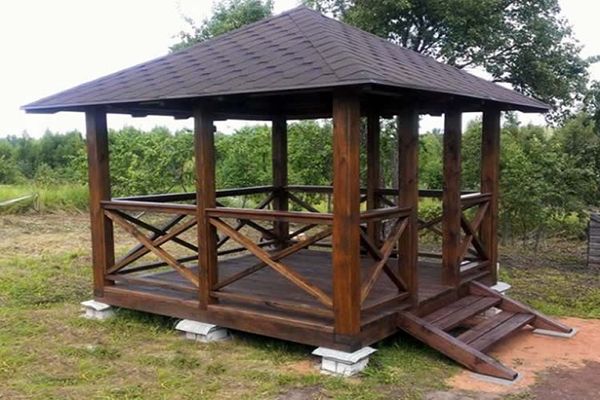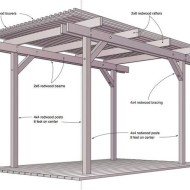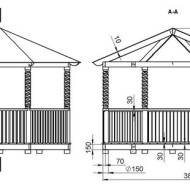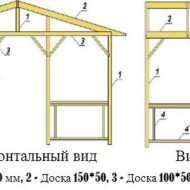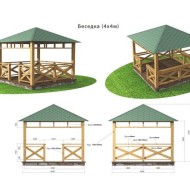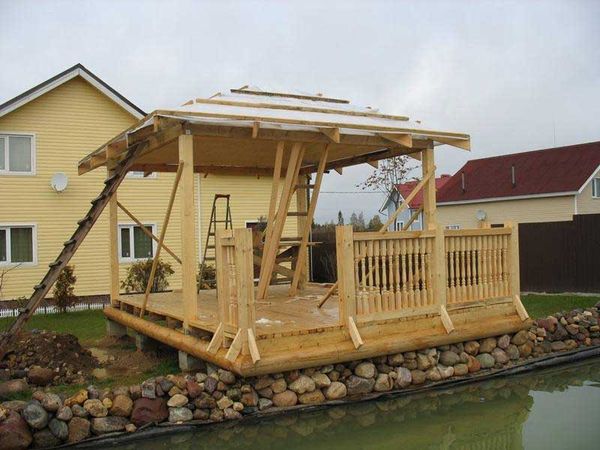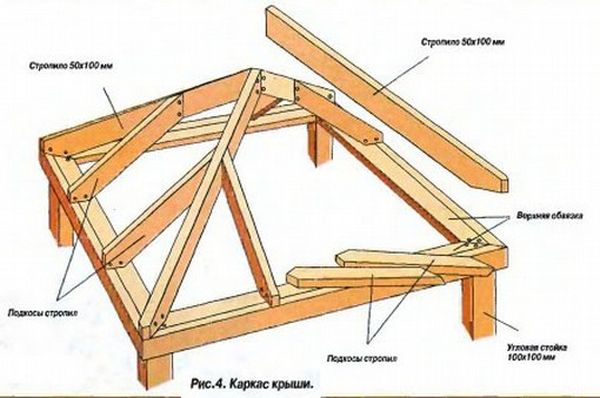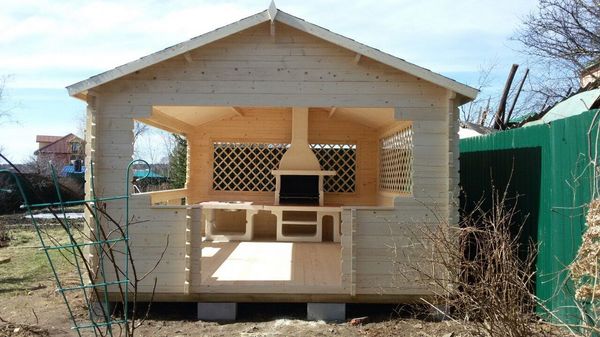Gazebo 4 by 4 meters: how to build a pavilion with your own hands
Content
Which design to choose
There are many projects of all kinds of gazebos. There are drawings of open and closed structures made of expensive or budget building materials. Light open buildings do not require a strong foundation, they can be conveniently combined with a summer kitchen, but you can stay in closed and well-insulated buildings even in winter.
Often, the appearance and format of the structure depend on the financial capabilities of the owner and the size of the site allocated for construction.
Video "Building a gazebo with your own hands"
In this video, you will learn how to build a wooden gazebo with your own hands.
Training
The gazebo is not a veranda or a terrace, and should be located at some distance from the living quarters. If it is supposed to organize a summer dining room in it, then the distance to the kitchen should not be great. It is advisable to choose a site that is secluded, away from a noisy road, in the shade of trees. The soil should be dense, all hemp and tree roots in this place will have to be removed.
The next step is to combine the selected project with real terrain. The future design needs to be applied to paper, to think over the location of the windows and the entrance. According to the drawing, the amount of required building materials is calculated and the approximate cost is estimated.
According to the finished project, they also decide how the path will run, what plants will be able to decorate the surrounding landscape, and how to organize the interior.
The main elements of the simplest design of a 4x4 m gazebo for a summer residence, which is easy to build with your own hands, are:
- support posts on which the roof is attached;
- grillage to which the posts will be attached;
- columnar foundation at shallow depth;
- bottom and top strapping;
- roof - for a square building, it is usually made with four slopes;
- attractive filling of the side sections in the manner of a lattice, horizontal battens or a single plank sheathing.
Materials (edit)
Wood is an ideal building material for garden gazebos. Metal structures are more durable, but they significantly increase the cost of construction. True, to install a barbecue or a summer stove in a wooden gazebo, you will have to provide non-combustible base materials and impregnation from fire.
Here is an approximate list of building materials for the simplest gazebo:
- foundation in the form of pillars - concrete blocks will do, or you will need sand, crushed stone and cement;
- frame based on timber 14 × 15 cm (at the corners) and 10 × 10 cm for intermediate supports;
- the floor is lined with boards 15 × 4 cm;
- hipped or gable roof, timber rafters 10 × 5 cm;
- roof covering - flexible tiles, corrugated board or ondulin;
- sheathing of two walls with lining or planed boards of the block house type, for the other two wooden railings are provided;
- metal corners and self-tapping screws for fastening elements.
All used wood must be pre-treated with moisture-proof and antiseptic compounds.
Tools
In the course of construction work, you will need some tools. Make sure you have at hand:
- shovel and ax;
- hacksaw and saw;
- hammer and nail puller;
- chisel, drill and plane;
- roulette;
- stairs.
Work order
During the construction of the gazebo on your own, you will have to:
- lay a columnar foundation and organize the lower strapping;
- fix the support pillars;
- lay the floor;
- mount a rafter system, erect a roof;
- sheathe the walls.
Let's analyze the individual stages of construction in more detail.
Base
The easiest option is to use ready-made concrete blocks. If they are not there, the posts are concreted by hand, for which holes are dug at the corners of the perimeter to a depth of 60–80 cm. In the middle between them, holes are also dug for intermediate supports. Please note that an entrance is provided on one of the sides, therefore, in this place, the intermediate column is slightly displaced.
The future frame is formed from 6 pillars: 4 corner and 2 for the entrance. If you design corner doors, you can get by with 5 supports.
It is recommended to remove the sod around the entire perimeter of the future building and dig a shallow trench, creating a sand cushion in it.
Next steps:
- the bottom of the pits is covered and tamped with gravel by about 5 cm;
- pour concrete 10 cm, allow to harden a little;
- anchors are installed in the concrete pad for the future fastening of the support posts.
Another option: columns are placed strictly vertically in the pits and poured to the very surface with concrete. If the supports will be attached to the posts, the latter should rise 25-30 cm above the ground.
Walls
This role in the gazebo is played by the frame. It is assembled from vertical posts, to which the upper harness is also mounted. The supports are attached to each other using intermediate supports and a lower strapping, which is also made of thicker timber. Additional and corner supports are attached to the grillage and tied with an upper strapping made of 15 × 15 cm timber.
The upper and lower straps are connected using corners.
Although gazebos are often left open, sometimes one or both sides are covered to avoid contact with the environment. This is usually done with the far corner of the structure. For beauty, the walls are sheathed with decorative material - a block house or clapboard.
Roof
A gable or hipped roof begins with the installation of a diagonal cruciate ligament of planks on the ground. For strength, the bundle is strengthened with vertical bars.
In the center, a vertical support of the required height is installed, from which the rafters are allowed to go to the corners - the required amount for the number of slopes. An additional rafter is also mounted in the center of the ramp.
The hipped roof is formed in hip or hip design. The tent is used more often - four triangular slopes are brought together in the upper part. Hip type involves the creation of two slopes in the form of a trapezoid and two - according to the principle of triangles. To fix all parts in the blood center, a special run is organized.
The structure is lifted and fixed on the upper harness.
On top, the pitched frame is sheathed with a crate of boards. The distance between the boards depends on the selected roofing material:
- a continuous crate is required for flexible shingles (plywood can be used instead of boards);
- under the sheets, a step of 30 cm is enough.
The roofing material is fixed with screws or nails.
Floor
A board - "forty" 6 m long and 15 × 4 cm in size is allowed under the flooring. First, you need to pin the first board exactly, then fasten the rest to it without gaps. A small gap of 1.5–2 mm can be left to allow sediment to drain.
At the very end, a narrow gap may remain. The finished board is cut to its width.
How to decorate
Decorating is the last step. Here it is worth showing your own imagination by decorating at your own discretion not only the railings and walls, but also the roof. Usually, lining is used for the walls, but the railings can be covered with curly carvings, if you have the appropriate skills. The simplest thing is to paint or varnish wooden surfaces.
The decoration of the gazebo can consist of any suitable furniture.For convenience, sofas or garden wicker chairs are installed here, a chaise longue and a coffee table are suitable. It is worth laying a decorative path from the house to the gazebo.
Don't forget about plants. A pot of flowers at the entrance or climbing grapes on the walls will all serve the same purpose.
Where to put the brazier
Since eating outside is much more pleasant than within four walls, many owners of gazebos organize a barbecue or barbecue in them. Since in such cases it is necessary to deal with fire, when installing the brazier, a safe place should be properly equipped.
The rules are as follows:
- All wooden elements of the gazebo must be impregnated with a refractory compound.
- The plank floor is covered with ceramic tiles.
- There is always a reservoir nearby.
- On the leeward side of the gazebo, you need to provide a blank wall or fence.
A wide gazebo is a suitable choice for people who love freedom and scale.
If you are uncomfortable in a small city apartment, you will feel imposing in a 4x4 m country gazebo.

